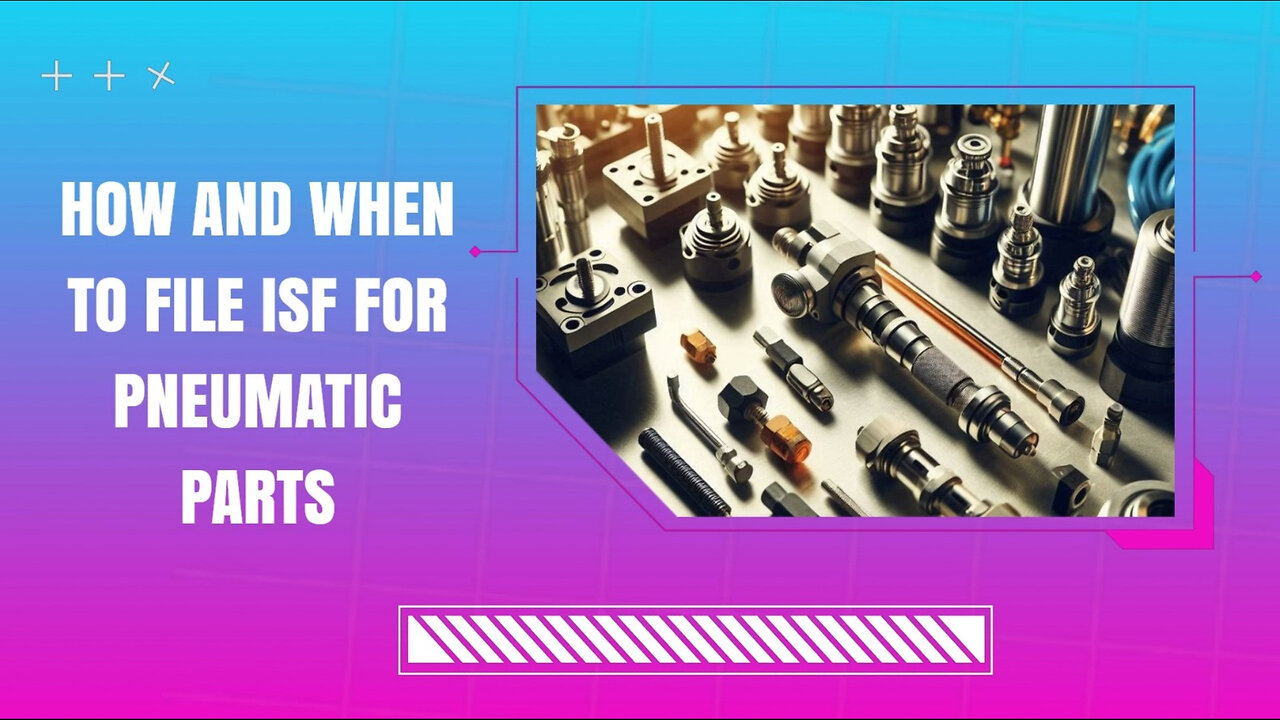Premium Only Content

Navigating ISF Requirements for Pneumatic Parts: A Customs Broker's Guide
- ISF Expedite
- Phone: 760-406-1099
- Email: info@isfexpedite.com
- www.isfexpedite.com
Welcome to our discussion on importing pneumatic parts and the process of filing an Importer Security Filing (ISF). Pneumatic parts are critical components used in various industries, and customs brokers need to understand the specific requirements and comply with ISF regulations.
Firstly, an ISF, or 10+2 filing, is a necessary requirement by US Customs and Border Protection (CBP) for all imported goods entering the United States by vessel. It is crucial for ensuring supply chain security and facilitating the smooth flow of goods across borders.
To file an ISF for pneumatic parts, you need to gather the required information, including importer details, manufacturer or supplier information, country of origin, and a detailed description of the parts imported. This information enables accurate completion of the ISF form.
The timing of the ISF filing is also important. According to CBP regulations, the ISF must be filed at least 24 hours before the goods are loaded onto the vessel that will transport them to the United States. Compliance with this timeframe is vital to avoid delays or penalties imposed by CBP.
While it is possible to file the ISF independently, working with a licensed customs broker can provide expertise and knowledge to navigate customs regulations effectively. A customs broker ensures the accuracy, completeness, and timely submission of the ISF, minimizing potential issues with CBP.
Once the ISF is filed, CBP reviews the information provided, and you receive a confirmation of filing. This confirmation should be kept on record as it may be requested during the customs clearance process. CBP utilizes the ISF data upon vessel arrival to assess the security risk associated with the imported pneumatic parts.
In summary, understanding how and when to file an ISF for importing pneumatic parts is crucial for customs brokers and importers. Gathering the necessary information, timely filing, and seeking the assistance of a licensed customs broker ensures compliance with CBP regulations and facilitates the smooth importation process.
Moving on to another vital aspect of customs brokerage – customs bonds. A customs bond serves as a financial guarantee between the importer, CBP, and a surety company. It ensures the timely payment of customs duties, taxes, and fees associated with imported goods.
There are two types of customs bonds: single transaction bonds and continuous bonds. Single transaction bonds are used for infrequent importations, while continuous bonds are valid for one year and suitable for frequent importers.
Obtaining a customs bond is a necessary step in the customs clearance process. Without a bond, CBP will not release the imported goods, leading to delays and potential storage charges. Importers can obtain customs bonds through surety companies that provide the required financial guarantee.
The amount of the customs bond varies based on the type of goods being imported. CBP usually sets the bond amount at 10% of the total duties, taxes, and fees paid by the importer in the previous year. CBP can increase the bond amount based on risk assessments.
In addition to ensuring the smooth release of imported goods, customs bonds play a crucial role in compliance with CBP regulations and protecting the revenue of the United States. CBP can make a claim against the customs bond to recover unpaid duties, taxes, or fees if an importer fails to meet their financial obligations.
In conclusion, customs bonds are indispensable for importers, ensuring compliance, facilitating smooth customs clearance, and protecting US revenue. By understanding the types of bonds, obtaining the necessary bond, and working with a reputable surety company, importers can avoid delays, penalties, and other issues associated with customs clearance.
Thank you for joining us in today's discussion on customs brokerage and international trade. We covered important topics such as filing ISF for pneumatic parts and the significance of customs bonds. These topics are critical for customs brokers and importers in maintaining compliance and facilitating efficient import processes.
In our upcoming episodes, we will explore other key aspects such as container security, customs valuation, and trade agreements. We appreciate your support and encourage you to subscribe to our channel and turn on notifications for future updates.
Thank you for watching, and we look forward to sharing more valuable insights with you in the future.
#usimportbond #isfcustomsbroker #uscustomsclearing #isfentry
Video Disclaimer Here: This is an educational video, no affiliation with any US government agencies.
00:32 - ISF Filing Process: Importer Security Filing (ISF), also known as a 10+2 filing, is required by U.S. Customs and Border Protection (CBP) for all goods, including pneumatic parts, entering the U.S. by vessel. Key information needed includes importer details, supplier information, country of origin, and a thorough description of the parts.
01:17 - Filing Timeline: The ISF must be filed at least 24 hours before the goods are loaded onto the transport vessel. Timely submission is essential to avoid delays or penalties from CBP.
01:38 - Customs Broker Assistance: While importers can file the ISF themselves, working with a licensed customs broker can help navigate customs regulations and ensure accurate and timely submission, thereby minimizing potential issues with CBP.
02:45 - Customs Bonds: Customs bonds are required for the release of imported goods and come in two types: single transaction bonds for infrequent imports and continuous bonds for regular importers. The bond amount is typically 10% of the previous year’s total duties, and it protects U.S. revenue by ensuring financial obligations are met.
-
 5:02:46
5:02:46
MoFio23!
13 hours agoNintendo Switch It UP Saturdays with The Fellas: LIVE - Episode #1
69.3K13 -
 4:26:49
4:26:49
BLoobsGaming
13 hours agoCan I get an Enhance Crystal Weapon Seed please!? MORE Corrupted Gauntlet
126K42 -
 7:35:05
7:35:05
BSparksGaming
1 day agoDynamic Duo! Marvel Rivals w/ Chili XDD
79.6K -
 7:00:42
7:00:42
NellieBean
15 hours ago🔴 LIVE - trying some COD maybe Pals later
81K1 -
 1:47:46
1:47:46
SpartakusLIVE
13 hours agoThe Master RIZZLER has entered the building, the 95% REJOICE
35.4K3 -
 29:53
29:53
MYLUNCHBREAK CHANNEL PAGE
1 day agoOff Limits to the Public - Pt 1
97.5K175 -
 16:03
16:03
Tundra Tactical
15 hours ago $20.11 earnedNew Age Gun Fudds
149K20 -
 8:22
8:22
Russell Brand
20 hours agoThey want this to happen
227K470 -
 2:06:43
2:06:43
Jewels Jones Live ®
1 day ago2025 STARTS WITH A BANG! | A Political Rendezvous - Ep. 104
127K41 -
 4:20:41
4:20:41
Viss
19 hours ago🔴LIVE - PUBG Duo Dominance Viss w/ Spartakus
99.5K13